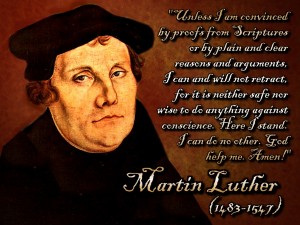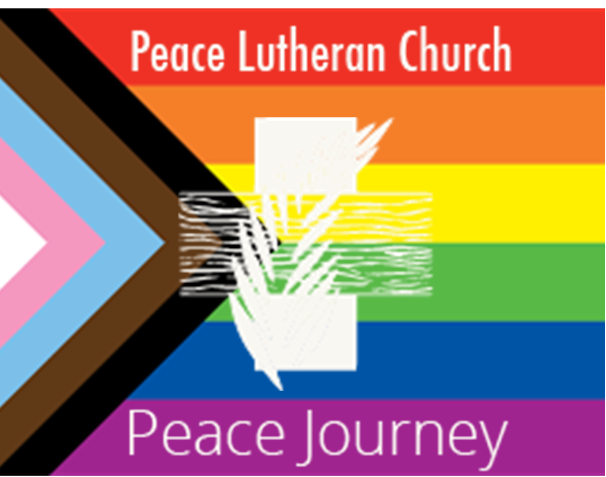Martin Luther—the Historical Reformation

Return to Lutheran Teachings
The blog site 500 years ago
500 years ago in Germany Martin Luther nailed the 95 Theses to the Wittenburg Church Doors—the blog site of his day. At stake was the identity of the church: Is it an authoritarian institution requiring subservience; or is it a ‘community of listeners’ paying attention to God’s Spirit and the Wisdom in order to make life a blessing for all?
Europe erupted theologically and politically. Lutherans proclaimed that faith is a gift which inspires personal and social responsibility. This belief prompted accusations of heresy and its chief critics condemned Lutherans as “Free Thinkers”.
A prominent teaching of Luther’s was the Priesthood of All Believers: faith is not mediated by a priest. Numerous historians today credit this notion as the seed of what became democracy in Europe and America.
Other Breakthroughs…
Luther insisted on integrating ancient wisdom with contemporary ideas and values: he held the tension that history has essential insights to reveal but religion has no value in merely imitating the past. He composed hymns from the melodies of popular songs. He encouraged the clergy to marry—an affirmation of sexuality and love. When other Protestant groups wanted to throw away the Old Testament, Luther tenaciously fought to keep the Hebrew Scriptures as part of the Christian Scriptures. He recognized our critical historical foundation within the Judeo-Christian continuum. Luther was a brilliant exegetical scholar—that means: Having mastered the Hebrew and Greek languages he could examine the original biblical texts in their own context not merely express his opinions about the Latin translation of the bible which was the ‘inaccessible’ norm in his day. Therefore he knowledgeably translated the scriptures into contemporary German so that all the lay people could read and debate the bible too. Luther treasured all the arts. He insisted the grace of God in Christ frees us to be as generous, forgiving and compassionate as God with one another.
Luther was a prolific writer
His collected works now number 55 Theological Volumes in English. The entire collection was donated to Peace by Dr. Paul and Phyllis Harms. If you wish to read any of them they are available to you.
Luther, the movie…
The movie Luther conveys his story well. Luther is a 2003 biopic about the life of Martin Luther (1483–1546) starring Joseph Fiennes. It was an independent film partially funded by Thrivent for Lutherans. The film covers Luther’s life from his becoming a monk in 1505 to the Diet at Augsburg in 1530. It is available on Netflix.
Man of the Year, Time Magazine
In the 1980’s Time Magazine (in the spirit of their “Man of the Year” series) researched and designated the “3 Most Influential People” in the Western World during the past 2,000 years. They chose: Jesus, Martin Luther and Karl Marx.
Constant Reforming…
Finally, Luther came to understand that the church must be constantly reforming. The church exists to struggle with people to discover meaning in their lives; to engage in prophetic critique of the society; and to provide pastoral care. The constant temptation for the church is to avoid this reforming spirit.
Peace attempts to live with the awareness and willingness to face and make necessary changes—in worship, justice, ethical issues, interfaith relations and spiritual practices. A joyful and liberated faith delights in nourishing the unfolding possibilities of life!
